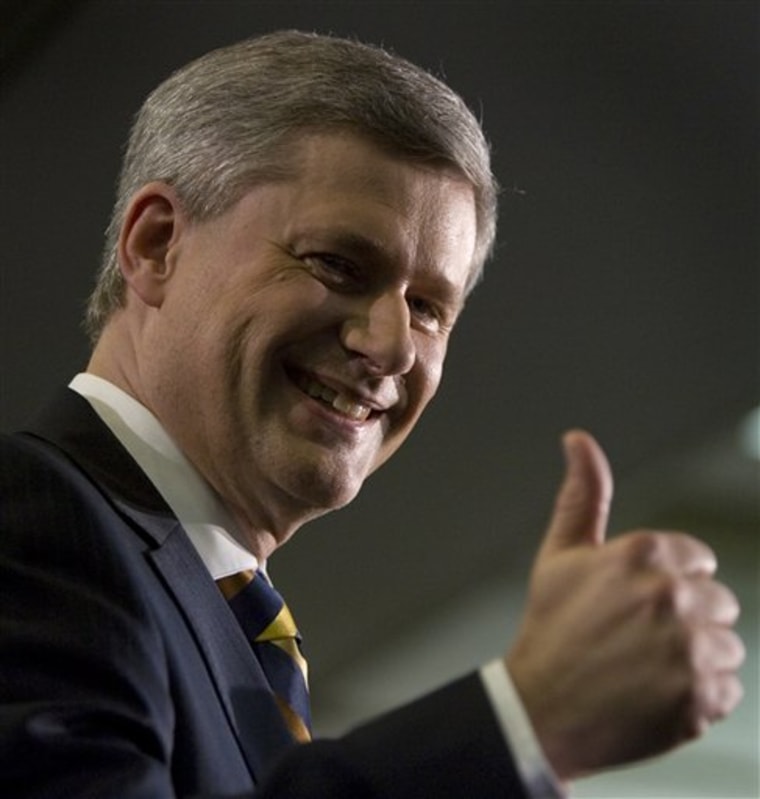Prime Minister Stephen Harper is gambling that an opposition pushing an unpopular carbon tax will steer Canadian voters to the right in Tuesday's election and bolster his hold on power.
If the polls are any indication, though, Canada's third national ballot in just over four years will give the country yet another minority government.
Harper's Conservatives did not win an outright majority in the 308-seat Parliament in the 2006 election. As a minority government in the previous Parliament, the Conservatives had to rely on the opposition to pass budgets and legislation.
In the 2006 election, opponents painted him as a right-winger who would reshape the landscape like a U.S. style Republican.
"Just because someone's a Conservative doesn't mean he's George Bush," Harper told voters in Quebec on Saturday.
The opposition Liberals have traditionally been the party in power in Canada, forming the government for more than two-thirds of the last 100 years. Analysts say Harper is intent on destroying the Liberal brand and wants to instill conservative values in Canada.
Harper hurt himself when he said during a debate that Canadians weren't concerned about their jobs or their mortgages. Days later, he said stocks were cheap.
Canada's main stock exchange then had its worst week in almost 70 years.
Concerns about the economy
Harper has since tried to undo the damage by saying he knows Canadians are concerned about the economy. He contrasted Sunday Canada's economic and fiscal performance to the more dire situation in the U.S.
"Americans are running deficits. We're running surpluses. Americans are incurring debt. We're paying down debt," Harper said.
"We have the lowest unemployment rate in 30 years ... We have a better economic situation than the United States because, for two and a half years, we have made better choices."
Recent polls show Harper is rebounding. A Harris-Decima poll put voter support for Conservatives at 35 percent, followed by the Liberals at 26 percent and the New Democrats at 18 percent. The Bloc Quebecois was at 10 percent and the Green party at nine percent. The left-of-center vote is divided among four parties, which may allow Harper to win a majority government even with less than 40 percent of the overall vote.
The poll results represented 1,284 interviews conducted Wednesday through Saturday with a margin of error of 2.7 percent.
Tom Flanagan, a former campaign director for Harper and a political scientist at the University of Calgary, said the uptick for the Conservatives in recent days shows that Canadians had second thoughts about Liberal leader Stephane Dion as prime minister.
"I don't know how else you would explain this sudden turnaround," Flanagan said.
Dion is a former professor from the French-speaking province of Quebec whose struggles to communicate in English have become a major issue. He has moved his party to the crowded left by staking his leadership on a "Green Shift" tax plan. Dion, a former environment minister who named his dog Kyoto after the site of the first climate change accord, wants to introduce a carbon tax on all fossil fuels except gasoline.
Targeting energy costs
The Conservatives have been targeting Dion's plan in television and radio ads, saying it would drive up energy costs. Dion has said he would offset the higher energy prices by cutting income taxes.
"The Conservative ads continue to be really negative on Dion and they have more or less made his mannerisms and his speech and his appearance the election issue," said Robert Bothwell, director of the international relations program at the University of Toronto.
Dion has had little success selling the plan to Canadians, many of whom view him as a weak leader.
"Coming into an election with a promise to enact something called a tax, no matter if it's one cent on bubble gum is not a sensible tactic," Bothwell said.
Harper supported the U.S.-led war in Iraq when he was in the opposition in 2003. Dion was part of the Liberal government at the time that opposed the war.
Harper, who once derisively referred to Canada as a "northern European welfare state," said during this campaign that Canada has become more conservative and said Canadians now celebrate the military as well as universal health care as sources of national pride. But he acknowledged that the Canadian public is not as conservative as some in his party.
As Conservative leader, Harper reduced former Prime Minister Paul Martin's Liberal government to a minority in 2004 and he won a minority in early 2006.
Harper controlled 127 seats across Canada in the last Parliament. He needs 155 seats for a majority government.
Extended Canada's military mission
Since becoming prime minister, Harper has extended Canada's military mission in Afghanistan and pulled Canada out of the Kyoto Protocol, which commits industrialized nations to reduce greenhouse gas emissions.
Flanagan said Harper has moderated in recent years.
"His views might have been similar to those of the Republicans in the United States but certainly not at this point," Flanagan said. "He's still right of center in his views. He favors all the values of the right, smaller government and lower taxes and open markets and so forth, but he'll depart from any of those values at any time for political reasons."
If he wins a majority, just how conservative he truly is remains to be seen.
Stephen Clarkson, a political economy scientist at the University of Toronto, said Canadians may fear a Conservative majority led by Harper.
"He comes from the neoconservative school of thinking represented in the Bush administration," Clarkson said.
Bothwell said he is an ideologue.
"He's backtracked to keep himself in power until the right moment has arrived," Bothwell said. "I don't see any evidence of moderation. I do see evidence of political calculation."
